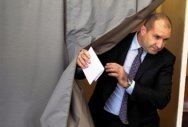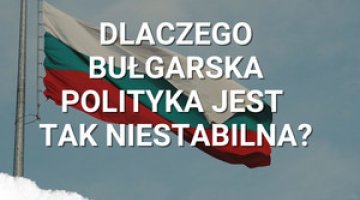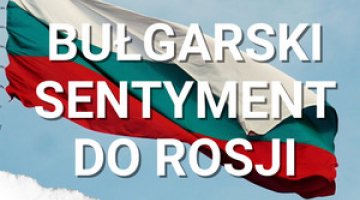President Radev: a time of political changes in Bulgaria

The Bulgarian presidential elections have been won by former Air Force Commander Rumen Radev, a non-party candidate, who ran with the support of the opposition Bulgarian Socialist Party (BSP). In the second round of the elections held on 13 November, he won 59.4% of the vote, convincingly beating Tsetka Tsacheva, the candidate from the governing party Citizens for the European Development of Bulgaria (GERB). The clear victory for Radev, a political novice from outside the political establishment, has revealed the scale of the Bulgarian public’s disappointment at its political class. GERB’s first electoral defeat in a decade has led to a crisis; the leader of the party, Prime Minister Boyko Borisov, has resigned, and a technocratic government will most likely take over. It will be exceptionally difficult to create a new majority in the current parliament, which in practice means early general elections will be held next spring. The agenda for the next election campaign has been set by anti-establishment groups whose agitation led to a referendum on reforming the electoral system (which was held together with the first round of the presidential elections); this forces the political elite to address a long-ignored demand to introduce majority voting. In foreign policy, Radev’s win will lead to Bulgaria adopting a more conciliatory tone towards Russia, as the president-elect (in contrast to the outgoing President Rosen Plevneliev) favours close cooperation with Moscow. However, the main directions of foreign policy will be determined by the government which emerges after the spring elections.
The presidential campaign as a plebiscite on support for the government
Radev’s victory is the result of a mistaken strategy by the GERB, which at the beginning of the presidential campaign appeared the favourite to win, as it had dominated the political scene since 2009. For years Prime Minister Borisov was the most popular politician in the country, and he had been considering running in the presidential election himself. Ultimately, in the name of the stability of the coalition government, he nominated the president of parliament Tsetka Tsacheva. At the same time he announced that he would resign if Tsacheva did not win the largest number of votes in the first round (she came second with 22%; Radev received 26%). During the campaign, the uncharismatic Tsacheva failed to emerge from Borisov’s shadow, giving the impression of being a weak candidate, devoid of autonomy. The opposition Socialists, who like GERB had a problem choosing a candidate from their own ranks, supported the little-known former Air Force Commander Radev (a profile of whom is given in the appendix). Strong party leaders were only put forward by the smaller groupings, the right-wing Reformist Bloc and a coalition of nationalist parties, whose candidate came third in the first round of the presidential election with 15%.
The main theme of the presidential campaign was international issues, especially the migration crisis and Bulgaria’s policy regarding the EU and Russia. GERB stressed that a centre-right candidate would guarantee political stability and close cooperation with the EU, while they also tried to present the socialist candidate as a representative of the interests of Russia. However, Radev was effectively able to present himself as a candidate above parties, from outside current politics, who would strengthen the security of the state. He attacked GERB for its passive foreign policy, in particular regarding migration (he suggested revising the Dublin Convention) and the deterioration of Bulgaria’s relations with Russia. On the one hand Radev courted the pro-Russian electorate, stressing his opposition to the sanctions imposed on Russia and making ambivalent comments on the issue of the annexation of Crimea. On the other hand, however, he skilfully rebuffed accusations of being a ‘Kremlin agent’ by pointing to his military training in the United States and stressing that Bulgaria will remain a loyal member of NATO and the EU.
Social unrest concerning changes to the electoral system
In parallel with the first round of the presidential elections, a referendum was held on changes to the electoral system, initiated by the anti-establishment movement led by the television showman and musician Slavi Trifonov. Officially the result of the referendum is non-binding (falling just 13,000 votes short of being valid).
The main political forces are trying to find the answer to the following issues raised by the referendum:
- the introduction of a majority voting system (supported by 72% of the voters);
- compulsory voting (supported by 62% of the voters. Parliament introduced a solution in April, which was applied for the first time in the current presidential elections; failure to vote twice in elections of the same type will result in deletion from the electoral list and the need to re-register);
- limiting the state funding of political parties (supported by 72%).
The new political dynamics
By submitting his resignation, Prime Minister Borisov announced that he will not seek to create a new coalition, but will rather push for early elections. The main opposition force, the BSP, seems also in favour of this solution as it will be extremely hard to hammer out a new coalition in the current parliament. In practice, this means that a technical government convened by President Plevneliev will take charge. The President has already announced that he will coordinate the composition of this cabinet with the president-elect. The transitional government’s powers are limited by the constitution, and de facto come down to organising the elections.
The success of Radev, in conjunction with the results of the referendum, has demonstrated the scale of public demand for the replacement of the current political elite, and has also undermined the dominance of GERB. Currently Borisov’s party is trying to take over the mood of protest, hence its sudden support for the proposal to introduce majority voting; this is intended to put GERB in the forefront of the electoral changes. Radev’s victory, although he was formally a non-party candidate, gives the left a chance to rebuild a political position weakened by numerous corruption scandals and a lack of credible leaders. The Socialists are trying to join in with the new rhetoric, and have also suggested they would support the introduction of majority voting. It is difficult at this stage to assess the prospects for real changes to the electoral law, although it is unlikely that the political parties will manage to work out a comprehensive reform programme during the course of the election campaign that would meet the strong public demand for change.
Radev’s victory also affects the new alliances on the political scene. GERB has thus far cooperated with the Reformist Bloc, which is currently falling apart in connection with disputes as to whether it should continue working with Borisov. The main Turkish minority party and the nationalist parties, which have hitherto provided partial support for GERB in parliament, will now probably develop their cooperation with the left. Their electorate strongly supported Radev in the presidential elections.
Implications for foreign policy
Radev’s decisive victory and likely replacement of Borisov’s cabinet with a technical government mean that the new president will be able to set the tone for Bulgarian foreign policy until the new elections are held (Radev will take office next year on 22 January). The directions of his policy were not clearly defined in the election campaign, in which he mostly employed general slogans of ‘assertiveness’ in foreign policy as well as improved relations with Russia, which is a traditional idea of the Socialists. At the same time, he proposed strengthening Bulgaria within the EU, maintaining strategic relations with the United States, and winning a leading position for Bulgaria in the Balkans. He also insisted that he will seek to strengthen the economic dimension of foreign policy (he has announced the appointment of a special advisory body to the President).
In European politics, Sofia should not be expected to make any big changes, even if the Socialists do take power after the early parliamentary elections. However, we cannot exclude a weakening of the previously close cooperation between Bulgaria and Germany which was the hallmark of the Borisov government. The unstable political situation will probably hamper Bulgaria’s preparations for the EU Presidency at the beginning of 2018.
Appendix 1
The importance of the presidency in Bulgaria
The President of Bulgaria jointly decides the country’s foreign and security policy (for example, he participates in NATO summits, but not those of the European Council), but it is the government which sets the direction and content of foreign and defence policy. The head of state also has a limited influence on domestic policy. He has the right to veto laws (the parliament can reject such a veto by an absolute majority) and can influence some nominations to institutions of state (he nominates one-third of the Constitutional Court, the prosecutor-general, ambassadors and others). The head of state also plays an important role during government crises; if no government can be appointed, he may appoint a technical government and calls new elections.
Appendix 2
Profile of Rumen Radev
Rumen Radev (born 1963 in Dimitrovgrad) began his career in the Bulgarian air force in 1987 after graduating from aviation school in Dolna Mitropolia, gradually rising to the rank of major-general and Commander of the Air Force (2014-July 2016). In 2000 he received the degree of Doctor of Military Science from the Georgi Rakovski Military Academy in Sofia in field of tactical training of pilots and air combat. In 2002-2003 he attended a postgraduate course at the Air University of the US Air Force in Maxwell, Alabama. In 2009, he was appointed Deputy Commander of the Air Force, where his duties included the process of preparing to purchase new fighter aircraft. In 2014, he was appointed Commander of the Air Force. During the rule of Boyko Borisov’s second centre-right government (November 2014-November 2016), he came into conflict with the defence minister, and in October 2015 he tendered his resignation, protesting against low expenditure on the air force and delays in renovating engines for the MiG-29 fighters. He withdrew his resignation after talks with the Prime Minister. In July 2016 he resigned again, criticising the government’s programme to allow NATO countries to carry out air policing, which he compared to the Treaty of Neuilly of 1919 (a synonym for defeat and disgrace in Bulgarian political debate). During his election campaign, Radev stressed the desire to improve relations with Moscow and criticised the EU sanctions imposed on Russia in connection with the annexation of Crimea; he also called for the strengthening of the economic dimension in Bulgaria’s foreign policy. He emphasised that Bulgaria must be a loyal member of NATO and the EU, while at the same time requesting “a review of Bulgaria’s membership in NATO and the EU”, and stressed that Bulgarian foreign policy “must be implemented in Sofia". Radev was formally a non-party candidate, who was put forward by a public committee, but his candidacy was at first proposed, and then promoted, by the Bulgarian Socialist Party (the vice-president will be Iliana Yotova, a BSP deputy in the European Parliament). Radev has been married twice and has two children.




